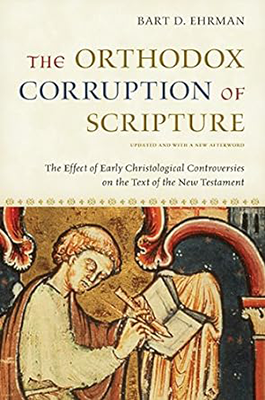The Orthodox Corruption of Scripture
“The Orthodox Corruption of Scripture: The Effect of Early Christological Controversies on the Text of the New Testament” is a book by Bart D. Ehrman, published in 1993. In this work, Ehrman explores how early Christian theological disputes influenced the textual transmission of the New Testament. Here’s a summary:
Main Themes:
Christological Controversies: Ehrman examines the theological debates surrounding the nature of Jesus Christ in the early centuries of Christianity. He focuses on controversies such as the adoptionist and separationist movements, which questioned whether Jesus was fully divine from birth or only became divine at a later point.
Corruption of Texts: Ehrman argues that these Christological controversies had a significant impact on the textual transmission of the New Testament. He contends that scribes and copyists, often motivated by theological biases, made intentional alterations to the text of the New Testament in order to support their particular doctrinal positions.
Textual Variants: Ehrman identifies specific textual variants in the New Testament manuscripts that he believes were the result of deliberate changes made by scribes. These variants often involve alterations to key passages that relate to Christology, such as the prologue of the Gospel of John or the Christological hymn in Philippians.
Orthodox Scribal Practices: Ehrman discusses the scribal practices of early Christian scribes and the ways in which they influenced the transmission of the New Testament text. He argues that scribes were not always impartial transmitters of the text but were often guided by theological agendas and interpretive biases.
Key Concepts:
– Scribal Tendencies: Ehrman identifies several common scribal tendencies that contributed to the corruption of the New Testament text, including harmonization, expansion, and omission. He illustrates how these tendencies were often employed by scribes to reconcile perceived discrepancies in the text or to clarify doctrinal points.
– Manuscript Evidence: Ehrman draws on manuscript evidence from the early Christian period to support his arguments about the corruption of the New Testament text. He examines specific textual variants found in different manuscript traditions and evaluates their significance for understanding the development of early Christian theology.
– Implications for Interpretation: Ehrman discusses the implications of his research for the interpretation of the New Testament. He suggests that recognizing the influence of early Christological controversies on the text can help scholars to better understand the historical context of the New Testament and the theological debates of the early Christian community.
Legacy:
“The Orthodox Corruption of Scripture” has been influential in the field of New Testament textual criticism, prompting scholars to reconsider the relationship between theological disputes and the textual transmission of the New Testament. While Ehrman’s arguments have been subject to debate and criticism, his work has contributed to a deeper understanding of the complexities of the New Testament text and its historical context.

